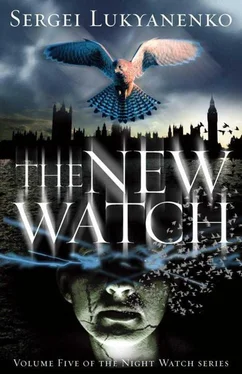Apparently he was simply going to walk away – along the corridor. But the floor under his feet suddenly shattered, spraying planks and small chunks of concrete in all directions. The golem that Jermenson had set in motion during the first skirmish had caught up with its adversary after all.
With an expression of extreme surprise on his face, the Tiger tumbled down into a pit, where the earth was heaving like boiling porridge. I caught a glimpse of the golem’s hands, the Tiger’s leg… For a second, I thought I could see a long, stripy tail sticking up out of the ground like a giant worm…
Then it all disappeared.
‘I’m afraid the golem hasn’t killed him,’ said Jermenson. ‘I’m afraid the Tiger simply didn’t think it necessary to fight…’
The coloured cobweb faded away. Gesar and Jermenson looked at each other, slowly breaking into smiles.
I leaned down to Nadya and asked in a quiet voice: ‘How did you help him?’
Glancing round at Kesha, Nadya went up on tiptoe and whispered in my ear.
‘I said that if he didn’t speak out his stupid prophecy right now, I was going to give him a thrashing and tell everyone that he’d been beaten by a little girl.’
‘And he believed you?’ I asked.
‘I punched him in the nose.’
I took my handkerchief out of my pocket and walked over to the boy. Handing him the handkerchief, I said: ‘Tilt your head back and press this against your nose. Now we’ll call a… doctor.’
And as he tilted back his head in confusion, I parted his fingers, took the toy that was clenched in them and stuck it in my pocket.
‘We were lucky,’ said Gesar, coming up to us. ‘The prophecy hasn’t been revealed, the Tiger has gone. Congratulations, my lad, all your troubles are behind you!’
‘We were lucky,’ I said, echoing Gesar.
The toy phone I had taken from Kesha was burning a hole in my pocket. I didn’t know if I would risk pressing the button to play back what was recorded on it. Or whether there really was anything recorded on it at all.
But it was certainly a good thing that the Twilight Creature didn’t understand anything about modern children’s toys.
‘I’LL BE TAKING the lesson today,’ said Gorodetsky. ‘Anna Tikhonovna is ill.’
‘What’s wrong with her?’ Pavel asked anxiously. ‘Something magical?’
‘Cholecystitis,’ Anton replied.
‘That can be cured with a spell,’ said Pavel. He was not much older than twenty, from the generation that had grown up on computer role-playing games and Harry Potter.
‘It can,’ Anton agreed. ‘But why bother, when you can take a medicine to expel the bile?’
‘Magic’s quicker,’ Pavel persisted.
‘And more complicated. Strangely enough, the illnesses that respond best to magical treatment are the deadly ones. Plain ordinary colds, gallstones, colic and haemorrhoids are easier to cure by ordinary means. And anyway, it’s always best to economise your Power and your capacity for magical intervention.’
‘What for?’ asked Pavel, glancing round at the other students, as if looking for support. ‘We’re much stronger than the Day Watch.’
‘That’s exactly what we’re going to talk about,’ Anton said, nodding. He walked round the classroom, running his eye over the students: ten Others, ten future magicians and enchantresses. Six adults, four children and juveniles. The usual balance – the age at which a person is identified as an Other can vary greatly. The youngest student, the Prophet Innokentii Tolkov, was ten and a half, and the oldest, the enchantress Galina Stanislavovna, was fifty-two. Some of them would join the Watch, and some would decide to carry on living a human life… or almost human.
‘How many students do you think there are in the Day Watch?’
‘Ten,’ said Pavel.
‘Afraid not,’ said Gorodetsky, shaking his head.
‘A hundred,’ answered Nadya.
‘That answer doesn’t count. You heard about it at home.’
‘So what?’ Nadya asked indignantly. ‘What difference does it make where I heard it?’
‘Well, you got it wrong anyway,’ said Anton, shrugging. ‘That was a long time ago.’
‘A hundred and fifty-three,’ muttered Innokentii.
‘That answer’s acceptable,’ said Gorodetsky, nodding. ‘Although I thought they had a hundred and fifty-one students, but I won’t argue with a Prophet. What does this imbalance tell us?’
‘That there are more bad people in the world than good ones?’ Galina asked in a quiet voice. Before being initiated she had been a teacher of Russian language and literature for senior-school classes in a small town outside Moscow. So Anton supposed she had a right to an assumption like that.
‘Not people, Others!’ Denis corrected her. He was thirty-something, a former soldier who had been discharged from the army during the reforms. Strangely enough, his human profession and his specialisation as an Other coincided – he promised to make a rather good Battle Magician.
‘Sorry, Denis, but people is right,’ Galina Stanislavovna said quietly, but firmly. ‘Others aren’t born bad or good… and neither are people, by the way. Others take the side of the Light or the Darkness depending on their state of mind at the time of initiation…’
‘One comment,’ said Anton. ‘Who wants to correct that?’
Several students raised their hands. Anton nodded at Farhad, a former manager from an oil company in Kazan. A self-made man with a successful career in business – people like that didn’t often become Light Others.
‘The terms Light Ones and Dark Ones don’t mean good and bad, or good and evil,’ said Farhad. ‘If we divide them using human yardsticks, they are altruists and egotists. Those who want the best for everyone around them and those who want the best for themselves.’
‘And occasionally, for their own personal benefit, Dark Others are capable of doing good for the people around them, while Light Others can occasionally cause them harm,’ said Anton, nodding again. ‘That’s right. Although I am surprised that you’re still poring over the basics… What does the Day Watch’s fifteen-fold advantage over us signify?’
‘There are more egotists among people,’ said Galina Stanislavovna.
‘The Night Watch isn’t as good at looking for future Others,’ suggested Denis.
‘Both explanations are good,’ said Anton. ‘We won’t try to determine how correct they are just yet. Tell me, in that case, why is the balance between the Watches maintained?’
‘Because you’re a Higher Other,’ said Denis. ‘So is Gesar, and Svetlana… and Nadenka’s an Absolute Enchantress!’
Gorodetsky nodded.
‘That’s right. The Night Watch has significantly fewer members, but at the same time we have a greater number of powerful magicians. And to get back to the previous question, this has been the normal situation over many centuries. There really are more Dark Ones. The Light Ones really are more powerful. Overall, there’s parity. And that, Pavel, is why you shouldn’t use magic for every tiny little thing. Where you can put your trust in science, that’s what you should do.’
Pavel nodded, although, to judge from his expression, Gorodetsky hadn’t convinced him completely.
‘Anton, have there ever been any attempts to alter the balance of power?’ asked Galina Stanislavovna.
‘Of course there have,’ said Anton, nodding. ‘The most far-reaching of them was called the Great October Revolution. Communist ideology was based on altruism and the experiment by the Russian Watches was officially sanctioned. Essentially, it was the greatest intervention by Others in human life after the Renaissance, the Great Plague and the independence of the North American states.’
Читать дальше











